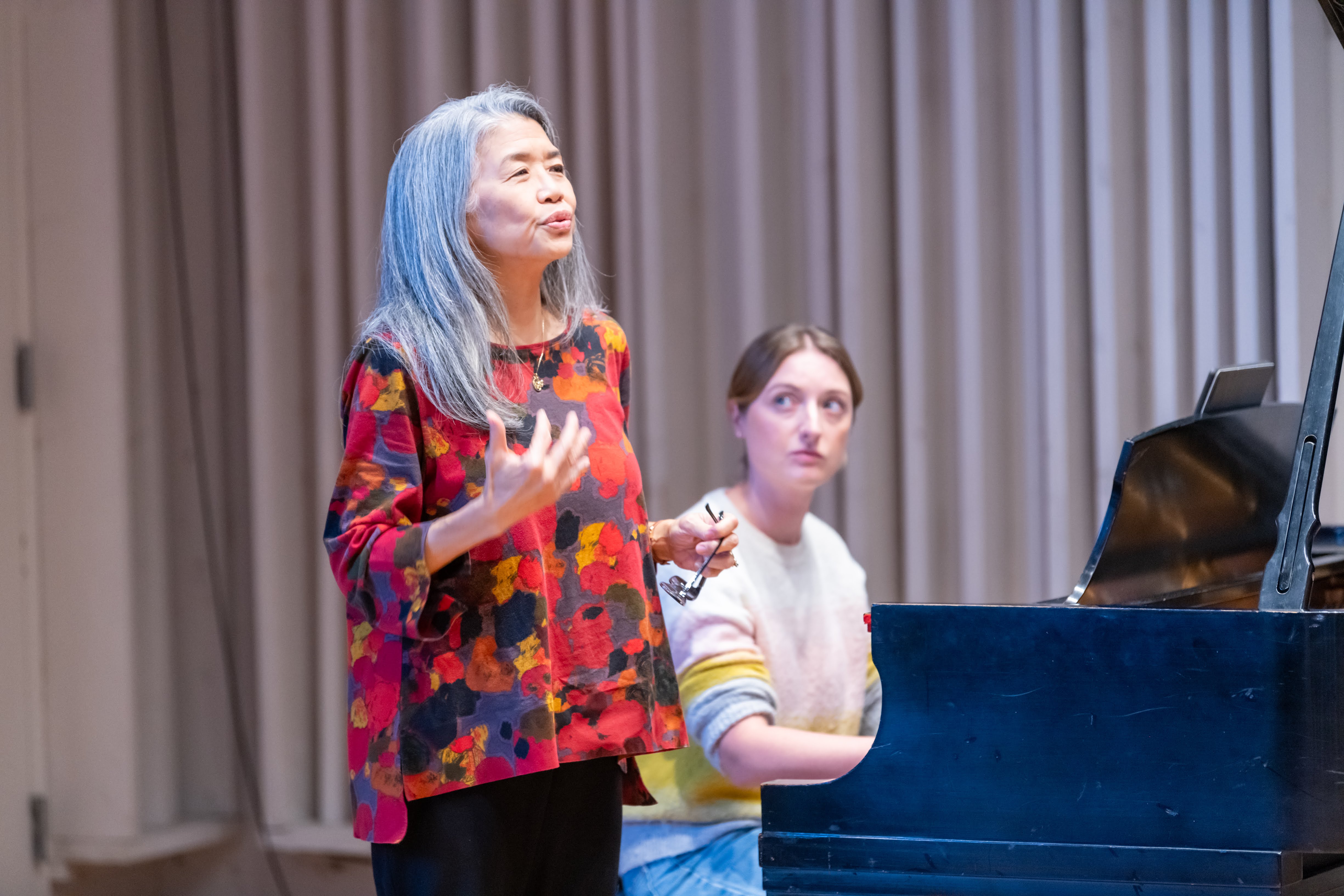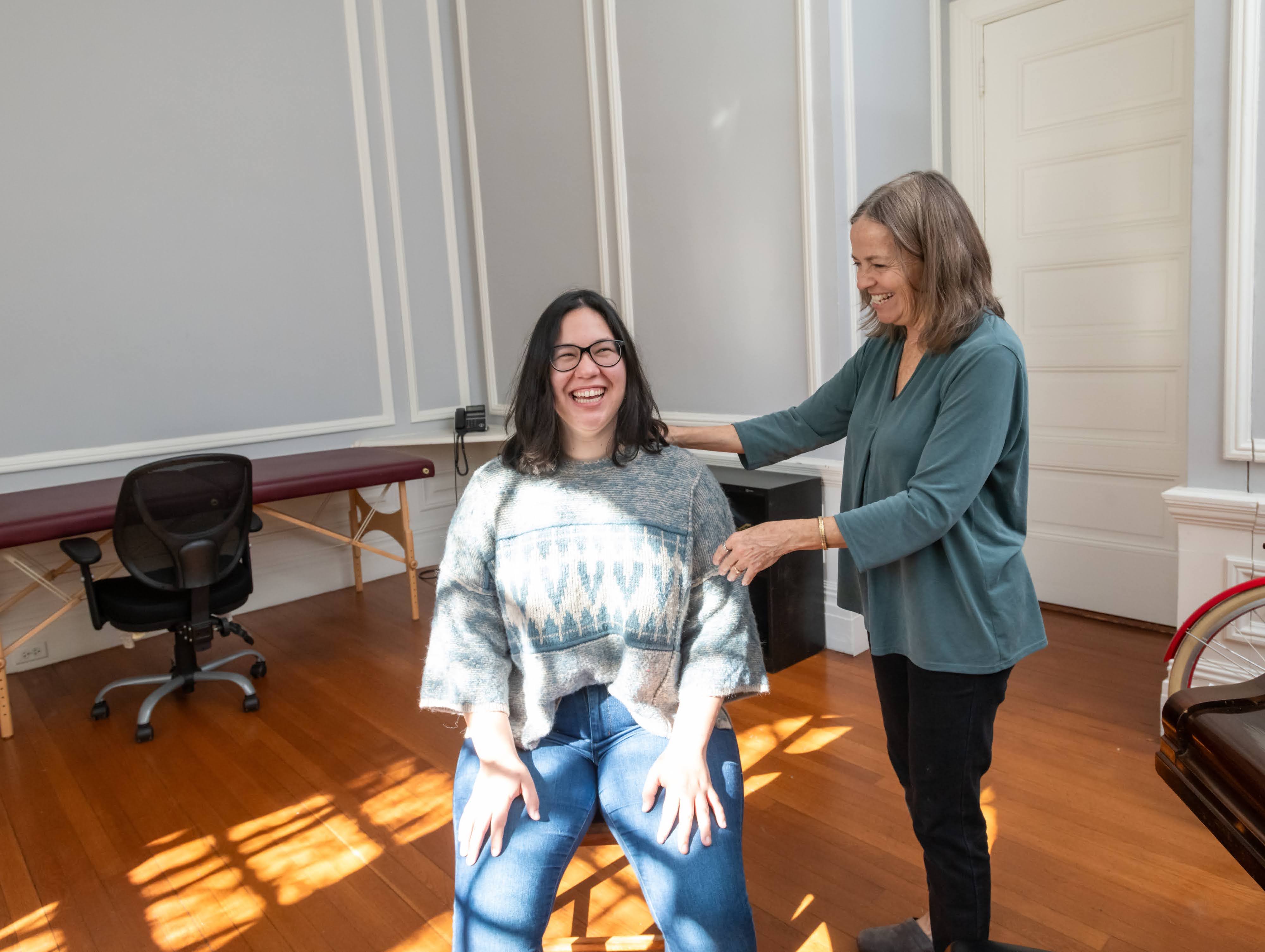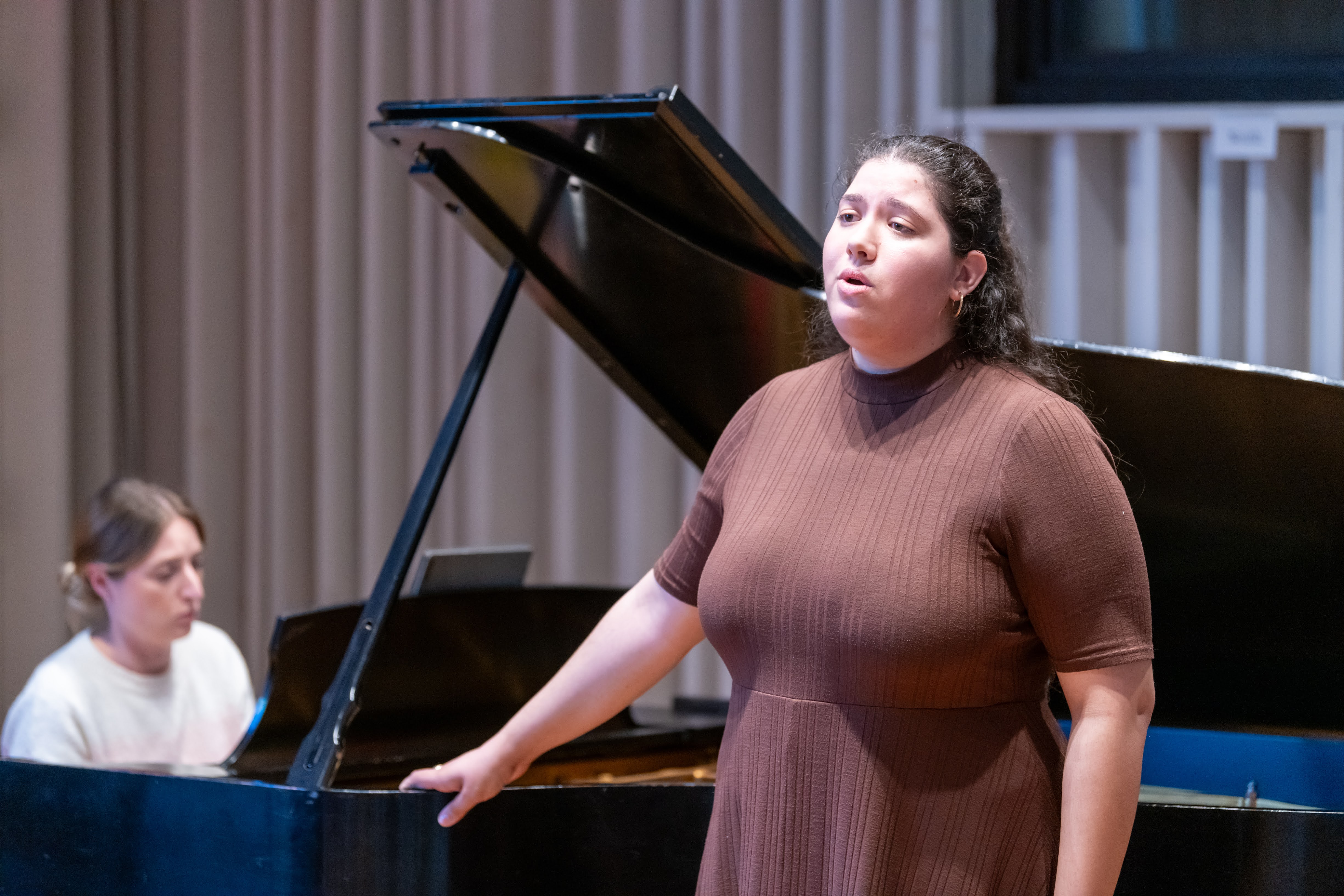Curriculum
The curriculum of the Vocal Arts Program is divided into three main components: core seminars, private instruction, and workshops. The coursework is designed to support students as they identify strengths, understand more clearly what they need to say, and what they can bring to a musical life that no one else can. Through these different components, students participate in weekly voice lessons, diction and repertory courses, training in acting, and opportunities to work with music of all kinds—established repertory, operatic works, scores with ink still wet on the page, popular song, and folk song.
Curriculum Structure
Curriculum Structure
A minimum of 62 credits; all credits must be acquired at Bard:- Voice Lessons: four semesters (CNSV 500, 3 credits)
- Vocal Coaching: four semesters (CNSV 505, 2 credits)
- Alexander Technique Workshop: four semesters (CNSV 530, 1 credit)
- Core Seminar: four semesters (CNSV 515, 3 credits)
- Diction and Phonetics Workshop: four semesters (CNSV 520, 521, 522, 523; 2 credits)
- Language Translation for Singers: three semesters (CNSV 524, 526, 527; 1 credit)
- Acting Workshop: two semesters (CNSV 535, 1 credit)
- Opera Workshop: three semesters (CNSV 537, 1 credit)
- Professional Development Workshop: one semester (CNSV 540, 2 credits)
- Vocal Chamber Music Workshop: one semester (CNSV 510, 1 credit)
- Vocal Ensemble Workshop: one semester (CNSV 542, 1 credit)
- Performance Workshop (CNSV 570, 0 credits)
- Recital Class: one semester (CNSV 545, 2 credits)
- Graduation Recital (CNSV 575, 0 credit)
-
 Core SeminarsThe Core Seminars are a four-semester sequence that develop the historical and cultural perspectives, analytical tools, and performance skills that distinguish vocal and operatic performance at the highest level. At the same time, the shifting focus reflected in the sequence of core seminar topics provides for intensive training in fundamental skill areas: working with text, expanding expressive and vocal resources and professional development.
Core SeminarsThe Core Seminars are a four-semester sequence that develop the historical and cultural perspectives, analytical tools, and performance skills that distinguish vocal and operatic performance at the highest level. At the same time, the shifting focus reflected in the sequence of core seminar topics provides for intensive training in fundamental skill areas: working with text, expanding expressive and vocal resources and professional development. -
 Private InstructionCourse work also includes concentrated weekly private instruction through voice lessons, either in New York City or on the Bard campus, Alexander Technique with Elizabeth Reese, and vocal coaching with Stephanie Blythe, Kayo Iwama, and rotating members of the VAP faculty.
Private InstructionCourse work also includes concentrated weekly private instruction through voice lessons, either in New York City or on the Bard campus, Alexander Technique with Elizabeth Reese, and vocal coaching with Stephanie Blythe, Kayo Iwama, and rotating members of the VAP faculty. -
 WorkshopsThrough additional workshops taught by various VAP faculty members, students participate in diction and repertoire and acting courses, a weekly Performance Workshop, Opera Workshop, and a Professional Development Workshop.
WorkshopsThrough additional workshops taught by various VAP faculty members, students participate in diction and repertoire and acting courses, a weekly Performance Workshop, Opera Workshop, and a Professional Development Workshop.
-
Core Seminar I: Poetry Into Song
Core Seminar I: Poetry Into Song
This seminar views text as a central point of departure for all vocal performance. It introduces and develops an essential range of workshop skills in working with text and understanding its realization in song. The choice of poets becomes a means of connecting with primary bodies of established repertory, with works by lesser-known composers from past style periods, and with music by contemporary and active composers. The seminar is designed to begin with a study of a poet’s life, work and style, and continues with a detailed examination of an appropriate musical exemplar. Workshop skills are further refined as the student works independently to find, prepare and perform related repertory. -
Core Seminar II: Music for Today
Core Seminar II: Music for Today
This course explores developments in vocal music, acknowledging an artist’s vital need to engage with music of and for today alongside canonical works that have shaped music history. With a curriculum that reflects contemporary currents in both music and broader society, the seminar incorporates the study and performance of seminal 20th and 21st century works with student-led exploration of living composers’ repertoire. Renowned guest artists, including performers and composers, contextualize, coach, and offer perspective from their careers. Selected course projects and performances since 2020 have included György Kurtág’s complete Kafka-Fragmente, a study of climate change and environmentalism in music, premieres of works in Yiddish at midtown Manhattan’s YIVO Center, and a survey of contemporary BIPOC-identifying composers. -
Core Seminar III: The Performer as Curator
Core Seminar III: The Performer as Curator
In this seminar each group of 3-4 students creates and produces with their pianist one concert and one outreach event, both of which are performed in nearby community venues. Every aspect of creation and production - searching for music, choice of repertoire, shaping the program, securing a venue, publicity, printed program and program notes, scheduling of rehearsals - everything is coordinated and organized by the students themselves. This seminar helps students appreciate a full range of options and possibilities available to them, in order to recognize the ways in which their individual strengths and acquired skills relate to these possibilities, and to better understand and appreciate the steps to realizing their musical, artistic, and creative goals. Building on skills and awareness acquired in the Professional Development Workshop (detailed below), students learn to develop working relationships not only with fellow musicians, but also with those involved in other essential roles in the industry, such as artistic direction, promotion, and grant applications. -
Core Seminar IV: The Singer and the Stage
Core Seminar IV: The Singer and the Stage
This seminar encompasses a fully staged operatic production and utilizes the skills developed in the three previous seminars. These productions strive to combine technical vocal artistry and dramatic skills with creative productions and ideas that are co-developed between the artists and the production team. The seminar also includes an intensive study of classical and Baroque operas by Mozart and Handel, through individual role development.
-
Acting Explorations
Acting Explorations
This workshop gives students an opportunity to focus solely on the acting component of performing. In a studio setting, students work on a variety of theatrical texts selected to address the particular needs of each performer. -
Diction and Phonetics
Diction and Phonetics
This workshop is an advanced study of the diction of the languages most commonly used by singers. German, Italian, and French diction are studied, with additional units in other languages such as Spanish or English. Also included is attention to the physiology of phonetics, in order to create a better understanding of how diction relates to the production of sound, as well as an exploration of the repertoire and composers of each language. -
Language Translation for Singers
Language Translation for Singers
This workshop, taught by Bard College language professors, develops translation skills, reading facility, and general cultural awareness of the three main languages used by singers: French, German, and Italian. -
Opera Workshop
Opera Workshop
The opera workshop develops the singing actor through creative questioning, acting and improvisation exercises, and aria and opera scene work. Stagecraft techniques are developed to create the most effective storytelling. Interpretation of character is developed through discussion, research, and analysis to enable clarity of communication and a personal artistic voice. Additional work in audition techniques and presentation of professional materials may also be addressed. -
Professional Development
Professional Development
This workshop consists of 13 encounters with a variety of professionals who present topics of interest necessary for the students’ development as individual artists. Led by Lucy Fitz Gibbon (VAP ’15) the workshop’s content ranges from “outer artist” concerns such as networking, auditioning, and promotion, to “inner artist” considerations of creativity, authenticity, and self-care. -
Recital Class
Recital Class
This workshop consists of 13 encounters with a variety of professionals who present topics of interest necessary for the students’ development as individual artists. Led by Lucy Fitz Gibbon (VAP ’15) the workshop’s content ranges from “outer artist” concerns such as networking, auditioning, and promotion, to “inner artist” considerations of creativity, authenticity, and self-care. -
Performance Workshop
Performance Workshop
Led by Stephanie Blythe, the weekly Performance Workshop offers all VAP singers an opportunity to perform in class, and share with their classmates. Students are encouraged to perform any wellprepared piece of their own choosing, three or four times a semester. -
Vocal Chamber Music
Vocal Chamber Music
The vocal chamber music workshop cultivates the skills of instrumental collaboration and is run in partnership with the Conservatory chamber music program. Vocal Arts Program students come together with Conservatory instrumentalists to perform works from the vocal chamber music repertory. -
Vocal Ensemble
Vocal Ensemble
Led by Erika Switzer, the study of duets, trios, and quartets from the art song repertory cultivates skills in listening and musicianship. The workshop culminates in a public performance of works for vocal ensemble.



